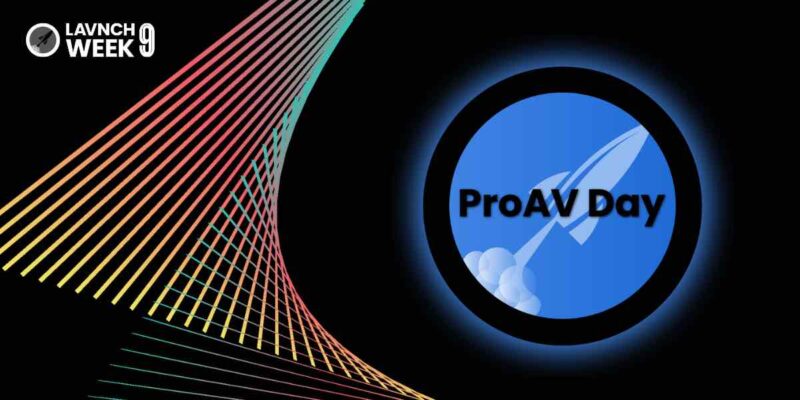A Short Conversation With James Ashby — Talking LAVNCH WEEK 2.0
James Ashby is the president of Edify Education Services — so, although he doesn’t necessarily work in the AV industry. But — he focuses heavily on data and helping education leaders around the world make decisions based on this data. So, it makes sense for him to deliver our keynote on reimagining the classroom during EdTech Day of LAVNCH WEEK 2.0. James is a self-described “data guy” so I know he will speak to worldwide trends that can help integrators and end users alike understand his thoughts on the future of education — so they can prepare for what the new classroom is going to look like.

This is an interview with James Ashby, as written by Steph Beckett. It has been edited for clarity.
SB: Tell me a little bit about your background — to give us context of how you got to where you are today. Your job and company are so interesting!
JA: Edify emerged from about 25 years of public education service that I was involved in — that went anything from being a public school teacher in my early years, (my first five years of my career) through, eventually becoming assistant superintendent in the Dallas, Texas metroplex area, as well as Knoxville, Tennessee … and eventually I was asked to join an international education technology company. after working with that group for a while, um, then, um, saw the need inside the United States, particularly for school local school leadership, to be able to, um, leverage the data that they have or create better data than they have. Edify is a consulting company that primarily helps education leaders around our country, as well as outside of the United States. We help them make decisions within the educational ecosystem based upon data. So really what the business is founded upon is acknowledging that school leaders need to make decisions based upon data, but they’re often not equipped or experienced in doing that.
SB: Can you speak a little bit about your keynote? Reimagining the classroom is something that has been in the news a lot — so I’m guessing you’ve gleaned most of what you’ll talk about from hard data points about what’s been going on in classrooms across the United States right now.
JA: One of the values that I can bring is that I’m seeing certain trends being discussed over and over and over again. And these aren’t necessarily trends. They’re actually things that superintendent cabinets are sitting down and talking about as their priorities. I’m guessing that in the end, anyone dealing with educational technology or technologies for education, you’re interested in the issues or questions that are really vexing educators, educate teachers, students, the education leaders, maybe even legislators. So, your audience members, I think are intersecting with those groups in different ways and at different times. And so one thing I thought would be helpful to talk to them about is what are the trends we’re seeing so that they are aware of those topics being relevant.
SB: Keeping in mind that this day is going to be integrator focused but with a few IT and AV managers for universities sprinkled in, what are some particulars you’d like the audience to leave with?
JA: I think it could be very relevant to your audience to know that there is a relationship between the innovations. And I would even say maybe if I made it more specific than just generally the technology with AV innovations, that they actually have an effect on giving a belief to the educator that a different learning environment can be possible and they shouldn’t underestimate that. I think that could be a really relevant point for them to hear, which I agree with. The second would be that with today’s social distancing issues, they’ve truly forced education leaders and education decision-makers to think differently about how to leverage technology.
SB: So in this new frontier or “new normal” as the kids are calling it, what does that look like in the education sector?
JA: In general, the concept I think we could probably agree on is that we want to come back to some kind of normality of engagement. We can’t keep 6 feet away from each other all the time and/or in distances from each other. Part of what I want to talk about in education — and about life — but just in education: Part of education is the intersections of minds, the meeting of minds and how that looks. The whole concept of the university itself is to bring differentiation of thought together, to challenge each other, to discuss that in each other. So that’s the normal part, not the new part. We want to make sure we don’t lose that. Otherwise, we’ve lost the whole notion of a university. The new normal is how we actually effect that kind of intersection and that engagement to take place. And prior to COVID, it appears that we were experimenting already. So the whole idea of doing an online classroom isn’t completely foreign to people in the room, but it wasn’t the prevalent way to do it either. A lot of the discussions I’ve been in with universities, their main interests in that were mostly economic. Now we may be able to shift the focus from economics, although that’s still important. Two, does it actually produce better learning? How can we leverage it to make it a better learning experience for the students?
Catch James Ashby at LAVNCH WEEK 2.0 on Thursday, June 25. Register here, and visit rave.pub/LAVNCHweek2 to learn all about LAVNCH WEEK.





